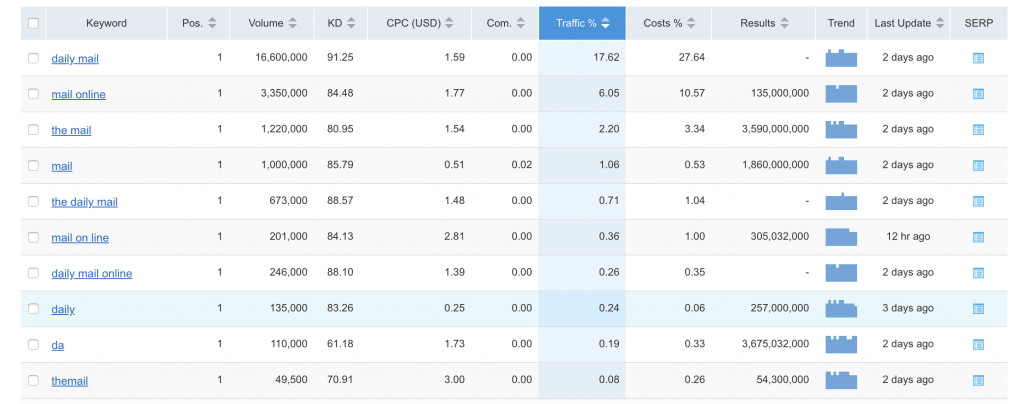Do you want your site to appear at the top of the search engine when users are searching for content similar to yours?
I’m guessing the answer is yes, but maybe you’re wondering how you can make this happen.
A study from the online ad company Chitika found that 33% of users click on the first organic result shown in Google and 18% on the second result. Not surprisingly the traffic numbers decreased by 95% for sites listed on page 2 of Google (Chitika, 2013). So, optimizing your site to rank high on a search engine is almost vital if you need to create brand awareness, gain higher traffic volume and increased conversions.
You’ll want to optimize your site to rank highly, in front of your target audience. The first thing you should identify is which keywords reach this audience, so you can optimize appropriately. What’s the point in ranking highly on Google for keywords that are irrelevant to you and your target audience?
Let’s start with the basics…
Keywords are the words and phrases in your website content that allow users to find your site from a search engine. For example, if you search for ‘yellow raincoat’ in Google, the search engine will match these keywords to sites that have been optimized for them.
Keyword research is the practice of identifying which keywords users are entering in the search engine to find results. If you know what people are searching for, you can establish which keywords to target rankings for, in order to help people find your site. This research task should be the first thing you do when building your site optimization strategy.
Why keyword research first?
If you were building a Lego statue, you’d need to look at the instructions before being able to build it successfully, right?
If you don’t read the instructions, what happens? You aimlessly try to build without using the most important asset that can aid your journey, and somewhere along the line, you’ll probably realise you’ve missed out a vital Lego piece from the build.
Compare this to building an SEO (Search Engine Optimization) or PPC (Pay Per Click) strategy: if you miss keyword research as a first task, or don’t allow your keyword research to instruct you – you’ll build your SEO strategy and prepare your PPC campaigns aimlessly.
Keyword research helps you to better plan your paid or organic campaigns and strategies. Through keyword research, you can discover many things, such as which keywords your target audience is searching for, which keywords your competitors have chosen to rank for and which keywords have the highest search volume. From this information, you can tailor your strategy to help your site reach people interested in your content.
Types of keyword
When you have your keyword data it’s important to be knowledgeable about which are the best keywords to try and rank for. The search volume may be high but the relevancy of the word to your site and the ranking competitiveness of the word need to be factored in.
The two main types of keywords are broad keywords and long-tail keywords. Broad keywords consist of singular words and are very competitive to rank for. For example, trying to rank number one on a search engine for the single keyword ‘football’ will be extremely hard because there will be millions of search results for you to compete against.

The second type of keyword is the long-tail keyword. Long-tail keywords consist of 3-4 words that make up a phrase for example ‘yellow and pink football boots’.

We can see here that the long-tail keyword has bought up fewer results than the broad keyword.
Highly descriptive search terms with three or more words make up the majority of search queries by individuals and the benefits of targeting these long-tail keywords are clear. They have much lower competitiveness because they are so specific. They are also more likely to lead to an increase in the quality of traffic and the number of conversions on your site. When people actively search for a very specific term, the search engine results should display the exact product the user searched for, i.e. yellow and pink football boots.
Targeting long-tail keywords helps to validate that the right people are looking at your tailored content. The alternative may be thousands seeing your site in search results; perhaps glancing at the title, clicking on the page and then realising it’s not for them – because it doesn’t fit their exact need.
What are the advantages of undertaking keyword research?
You’ve probably started to pick up the advantages of keyword research now, but let’s recap.
Keyword research allows you to:
- Find the best keywords that have the highest search volume – helping you to receive increased traffic
- Understand the language and terms your target market are using. You could be missing a huge market here if you aren’t down with the latest lingo. Understand if your target market is searching for your content through terms that you might not use
- Identify keywords you haven’t previously thought of – it can be hard to build your strategy effectively when all you have is a pen, paper and a mind map. Through keyword research, you can more efficiently add new ideas to your strategic plan
- Identify which keywords your competitors have chosen to rank for, so you can make sure your site ranks for them too
- Gain a better understanding of the market – for example, you can identify which services people are searching for most within your niche
- Improve your content pieces – optimizing your content for well-ranking keywords will be highly beneficial. It can mean that your content has a great chance of being seen. Imagine preparing amazing content that’s beautifully written, humorous and engaging, but no one reads it because it does not rank well in search engines. Sad 🙁
A little tip
Here’s a little tip for when keyword use doesn’t go too well…
It’s important not to overstuff keywords on your site. You should aim to optimize each page on your site for separate keywords but it’s important to remember that the sole purpose of the content on your site is not only to be read well by search engines but also by people. Adding too many different keywords or the same keyword multiple times in a piece of content will be unclear and uneasy to read, so even though people land on your page – they may not want to carry on reading after the first paragraph.
Platforms
You’re probably in the position now where you really want to get started with your keyword research, so I’ll introduce you to SEMrush – a keyword research tool that allows you to gather some great keyword data.
Here’s is a screenshot of the SEMrush platform for the domain http://www.dailymail.co.uk/

This report generated by SEMrush displays keywords that a site owner ranks well for. Below is an overview of the information you can interpret from this results page:
- Keyword: the keyword used to rank the page
- Position: position the keyword has reached in the search engine
- Volume: how many times that particular keyword is searched for
- CPC: this is the cost per click for the keyword. If you wanted to use this particular keyword in a paid advertising campaign, this provides you with an insight into how much each click on your ad might cost you.
- URL: this is the address shown in the search engine for the particular keyword
- Com: this column indicates the level of competition for a keyword. So, the lower the number here, the less competitive the market
- Results: this is the number of results a search engine displays when searching for the keyword
- Trend: the tiny chart in the trend column illustrates how the traffic trend has fluctuated for the keyword in the past year. It is important to check if the trend for this keyword is decreasing – this could mean the search volume will also decrease.
- SERP: This is the Search Engine Result Page. Clicking on this icon will take you to the google search engine result page, where you can see the page ranking in effect.
There are a number of ways you can use SEMrush to your benefit. Here are a few:
- Search for a keyword related to your business; see how it’s performing and how similar keywords are performing. This helps you select which keyword to target
- Search for a competitor site to see which keywords they rank for
- Do a domain vs domain search and compare your site directly to a competitor site, to find the keywords you’re missing
This is just one of the great tools out there that you can use to develop a keyword rich SEO and PPC strategy, in order to gain great results when optimizing your site.
Conclusion
I hope from reading this you can take away that keyword research is a vital component of a successful SEO or PPC strategy. It should be the first task you undertake when planning your campaigns. Give it focus when writing your content and when building your strategy. It can give you clear insights into your target market’s search behaviour, and help you get your site to appear in front of them more frequently. The aim, of course, is to rank above your competitors on many search engine result pages.
If you need help developing your SEO or PPC strategy, get in touch and together we can find out exactly which keywords will help your site gain a competitive edge. We’ll get you better-qualified traffic and great conversions.
